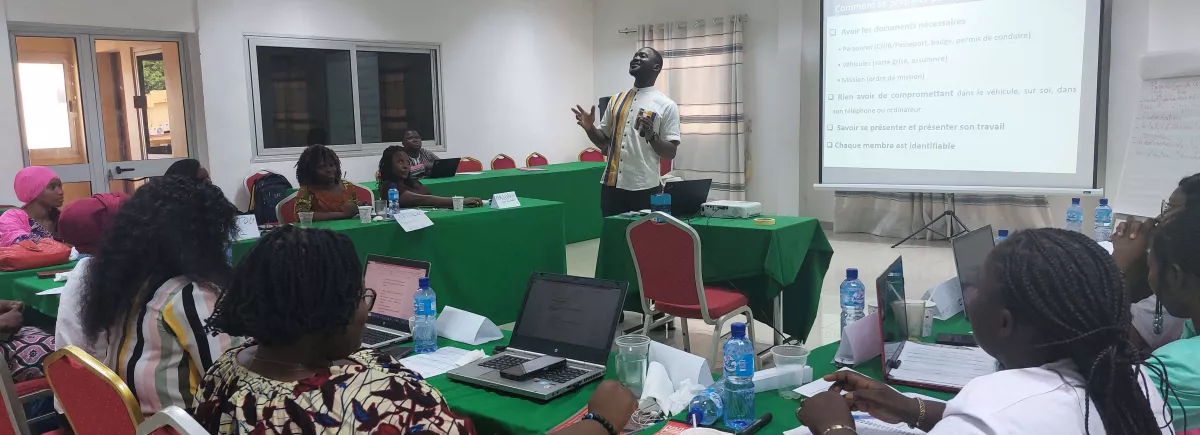
Equipping the Amazons of the news with the tools to ensure their security
Related project
MediaSahel for WomenFemale journalists and radio presenters recently received security training as part of the Mediasahel for Women project in Burkina Faso and Niger. Yousouf Maiga, who has been a specialist security trainer for six years, shared his knowledge with 12 women in a workshop held in Ouagadougou on 4 and 5 August.
Can you explain to us the aim of this security training aimed specifically at women?
Youssouf Maiga: The idea is to improve the skills of female journalists working in hostile and high-risk environments. The current security situation poses threats that may have a major impact on journalists, and women in particular. Our aim is to teach them the necessary behaviours, appropriate actions and reactions to adopt in high-risk environments. We want to prepare them to face up to potential dangers while complying with national, regional and international laws. Texts that protect them, while also governing their work in conflict situations.
What aspects do you address during the training?
Youssouf Maiga: Gaining a better understanding of their context is key to successfully performing their activities. They were taught to analyse their environment in order to identify the potential dangers that they could be faced with, as well as their weakness and vulnerabilities to those dangers. We trained them to better manage these vulnerabilities to enable them to carry on their work despite the risks. In this way, we addressed the way they present themselves to various contacts in order to obtain access and support, while also respecting customs and protocols. We also discussed how to react to crossfire and even how to recognise improvised explosive devices. We reviewed the protocols to follow in the event of a check, hostage-taking or sexual assault, etc.
Given the modules covered, how would you rate the reaction and involvement of the participants in light of the serious and delicate nature of the subjects?
Youssouf Maiga: The participants were highly engaged, which confirmed just how useful this training is. The security situation affects everyone; nobody is immune to it. Specific examples, including one of my personal experiences, were shared to illustrate the challenges. For example, during a coach journey through a risky area with regular checks, one passenger on board innocently used his phone. However, this drew the attention of the authorities, leading to the detention of the passenger and the seizure of his phone for further enquiries. Despite the efforts of the coach company and other passengers to secure that passenger’s release, the coach had to continue its journey without him. This story illustrated with great impact just how seemingly minor actions can have unforeseen and potentially risky consequences in already tense environments. Sharing this experience increased awareness of the need for increased vigilance and an in-depth understanding of the potential repercussions that our actions can have on everyone’s safety.
What are your hopes for the women who received the training?
Youssouf Maiga: I have trained Amazons. My hope is that they become representatives for their communities and colleagues by showing them behaviours that save lives. We hope they go out into the field despite the risks to seek out news and bring it to the people, because ultimately, nothing is without risk. I am available to continue supporting them beyond this training.


